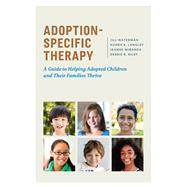Children who are adopted at an older age through foster care and those adopted from overseas orphanages are at high risk for behavioral and emotional distress. This important manual presents a structured, evidence-based protocol for providing mental health treatment to families adopting vulnerable children. Drawing on their extensive clinical experience as founding members of premier national organizations that serve adopted children and their families, the authors of this book describe the typical presenting behavioral problems of adopted children, as well as the underlying issues contributing to these problems that uniquely affect adoptive families. These include concerns related to parent child attachment, loss and grief, trauma, the child’s understanding of his or her adoption “story,” identity development, and birth family connections. Therapy sessions deliver evidence based child coping strategies and positive parenting approaches that are tailored to account for the child’s past history, alongside resiliency focused, trauma competent, attachment based treatment.
The book’s companion website provides free in-session handouts for practitioners. Given the unique needs of this clinical population, this book is essential for therapists who treat adopted and foster youth and their families.








